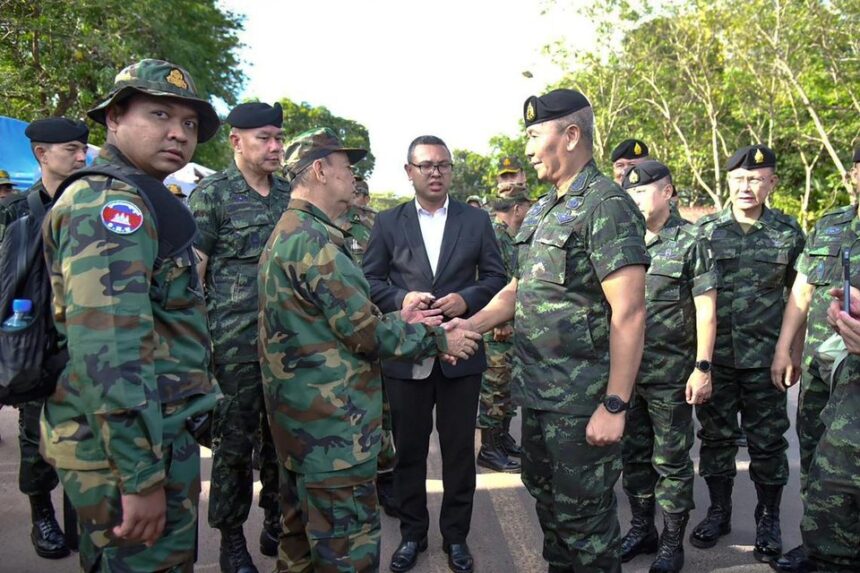BANGKOK – Thailand and Cambodia have begun easing tensions along their disputed border after both sides agreed to adjust military positions following a deadly clash on 28 May 2025.
The move comes after top-level talks and signals progress in a disagreement that has lasted for decades, especially in the undemarcated areas of Ubon Ratchathani’s Nam Yuen district.
Cambodia’s choice to withdraw troops and refill trenches near Chong Bok Pass has helped calm the situation, even as its push to involve the International Court of Justice (ICJ) highlights ongoing disputes.
The latest conflict broke out just before dawn on 28 May near the historic Chong Bok Pass, where the Thai district of Nam Yuen meets Cambodia’s Preah Vihear province.
Thai soldiers from the Suranaree Task Force, on a regular patrol, found Cambodian troops digging trenches in disputed territory. This broke a previous agreement to leave the area unchanged. Thai officials said Cambodian soldiers misunderstood the Thai patrol as a threat and opened fire, which led to a 10-minute shootout.
Cambodian Sergeant Suan Roan, aged 48, died in the exchange, while Thai troops reported no injuries.
Both governments acted quickly to cool things down. By 5:55 a.m., Cambodia’s Maj Gen Thol Sovann rang Col Boonserm Boonbumrung from the Thai side to propose a ceasefire. Fighting stopped, but soldiers from both countries stayed in place for a while, worrying nearby villagers.
Thailand Claims Self-Defence
Thai Defence Minister Phumtham Wechayachai, who is also Deputy Prime Minister, said Thailand’s troops acted in self-defence to safeguard the country’s borders. He called for calm and for both sides to use diplomatic channels like the Joint Boundary Committee (JBC) to avoid further trouble.
On 8 June, Cambodia agreed to pull back from the disputed area, refill the trenches, and return its forces to the positions held in the previous year. Thai and Cambodian commanders coordinated this step to make sure both sides followed through.
Lt Gen Boonsin Padklang, who leads Thailand’s 2nd Army Region, informed Army Commander Gen Pana Klaewplodthuk about the agreement, underlining both countries’ aim to keep the peace. Thai authorities had already tightened border controls, including shorter opening times at key crossings like Ban Khlong Luek in Sa Kaeo province, to avoid more clashes.
Despite recent progress, Cambodia’s plan to ask the ICJ to rule on four disputed spots—Ta Muan Thom, Ta Muan Toch, Ta Kwai in Surin’s Phanom Dong Rak district, and the Emerald Triangle in Ubon Ratchathani—adds a new twist.
On 2 June, Cambodian Prime Minister Hun Manet told the National Assembly that he was frustrated by the slow pace of negotiations and wanted the court to step in and settle the matter.
Preah Vihear Temple
Thailand, on the other hand, wants to keep talks within the JBC. Thai Foreign Minister Maris Sangiampongsa is set to lead the next round of discussions on 14 June in Phnom Penh. Thai leaders, including Phumtham, have pushed back against bringing the case to the ICJ, warning that it could make the dispute even harder to solve.
Border quarrels between Thailand and Cambodia go back more than a hundred years and have led to fighting before, including a major flare-up in 2011 over the Preah Vihear temple. The temple, which is listed as a UNESCO World Heritage Site, was given to Cambodia by the ICJ in 1962, a decision that still fuels strong feelings on both sides.
Recent events, including a standoff at Ta Muan Thom in February 2025, have stirred up nationalist voices, and after the May shooting, some Cambodians on social media called for a boycott of Thai products. However, the close relationship between former Thai Prime Minister Thaksin Shinawatra and Cambodia’s Hun Sen has kept lines of communication open, and both countries say they want peace.
As the next JBC meeting nears, the recent troop withdrawal and ongoing talks offer a reason for hope. Communities in Ubon Ratchathani, led by Governor Adisak Noisuwan, have shown their support by donating supplies to Thai soldiers stationed near the border.
While the possibility of an ICJ case still hangs over the situation, the quick pullback from Chong Bok shows that dialogue and careful negotiation could help keep the peace in this sensitive area between Thailand and Cambodia.














